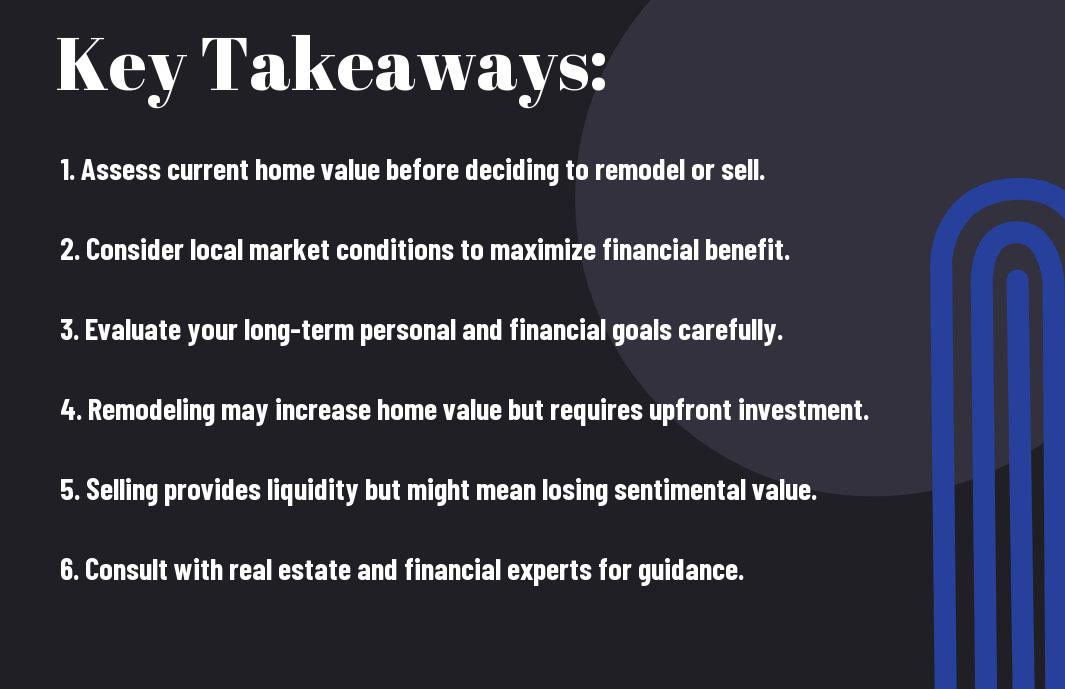With the real estate market constantly evolving, you may find yourself weighing the options between remodeling your current home or selling it for a new one. Each choice presents distinct advantages and challenges that can significantly impact your financial future and quality of life. Understanding your goals, assessing your budget, and evaluating market conditions are important steps in making the right move for you and your family. This post will help clarify the decision-making process and guide you in choosing the best option based on your unique circumstances.
Analyzing Your Current Home
The first step in deciding whether to remodel or sell is to evaluate your current home. This involves understanding its strengths and weaknesses, as well as how it aligns with your long-term goals. Take time to reflect on your living space, considering both its emotional and functional aspects. Through a thorough analysis, you can make an informed decision that will benefit you and potentially enhance your quality of life.
Assessing Home Value
To determine your home’s market value accurately, consider factors such as comparable sales in your neighborhood, current market trends, and any improvements made over the years. Engaging a professional appraiser or real estate agent can give you a detailed understanding of your property’s worth. This knowledge is crucial as it sets the stage for making informed choices about remodeling or selling.
Identifying Necessary Repairs
Value your home by identifying any necessary repairs that could enhance its livability and marketability. Assessing the condition of key elements like the roof, plumbing, and electrical systems is crucial in making your space comfortable and safe.
For instance, if you notice leaking pipes or walls with peeling paint, addressing these issues can not only improve your daily experience but also increase the overall value of your property. A well-maintained home attracts buyers and can prevent further costly repairs down the line. Prioritize repairs that directly impact functionality and safety, as these are likely to yield the best return on investment when deciding to sell.
The Case for Remodeling
One of the most compelling reasons to consider remodeling instead of selling is the potential to enhance your home’s appeal and functionality. By investing in renovations, you can create a space that better fits your lifestyle while potentially increasing the property’s market value. This allows you to enjoy your home more while reaping financial benefits if you choose to sell down the line.
Increasing Home Value
Value retention is a key advantage of remodeling your home. When you make strategic upgrades, such as modernizing the kitchen or updating bathrooms, you can yield a significant return on investment. These improvements not only appeal to prospective buyers but also position your property competitively in the housing market, ensuring that you receive a fair price should you decide to sell.
Personalizing Your Space
Space is another important factor when considering remodeling. Tailored renovations allow you to create an environment that reflects your unique taste and needs, ensuring your home feels truly yours. Whether it’s a custom-designed kitchen or a cozy reading nook, personal touches can dramatically transform your living experience.
For instance, if you love cooking, turning your kitchen into a culinary haven with bespoke cabinetry and high-end appliances will elevate your daily life while adding tremendous value. Likewise, creating dedicated areas for hobbies or relaxation, such as a home office or a spa-like bathroom, can enhance your comfort and enjoyment in your everyday living. Custom finishes and layouts not only cater to your preferences but also create a lasting sense of satisfaction in your home.
The Case for Selling
Not every home can or should be remodeled. If your property is located in a desirable area and the market conditions are favorable, selling may be the best option for you. A fresh start in a new home could provide the space and amenities you want without the hassle and expense of a remodel.
Current Market Conditions
After assessing the real estate market, you may find that it’s currently a seller’s market, where demand exceeds supply. In such conditions, you can potentially receive a higher price for your home, making a sale more appealing than investing time and money into renovations.
Financial Considerations
Case studies recommend evaluating your financial situation before you decide on remodeling versus selling. Selling your home may allow you to cash in on equity, providing funds for a larger down payment on a new property or better financial stability.
This evaluation should consider any outstanding mortgage, renovation costs, and the potential return on investment from a remodel. You need to analyze whether the cost of updating your current home surpasses the profit you could gain from selling it in a competitive market. If the numbers don’t align in your favor, it may be time to consider putting your home on the market instead.
Comparing Costs and Benefits
Despite the emotional ties to your home, it’s important to weigh your costs and benefits carefully. Both remodeling and selling have distinct financial implications that should be analyzed thoroughly before making a decision.
| Remodeling | Selling |
|---|---|
| Upfront construction expenses | Real estate agent commissions |
| Potential for increased home value | Closing costs |
| Disruption during the renovation | Market fluctuations impacting sale price |
| Tax benefits on improvements | Potential moving expenses |
Remodeling Expenses
After deciding to remodel, you should budget for various expenses, including materials, labor, and potential permit fees. It’s important to obtain clear estimates to avoid unexpected costs that can quickly accumulate during the renovation process.
Selling Costs
Selling your home involves various costs beyond just the sale price. You should factor in agent commissions, closing costs, and potential repairs needed to prepare your home for the market. Understanding these financial implications will help you make an informed choice.
Considering these selling costs is vital in determining the overall financial health of your decision. Agent commissions typically average around 5-6% of the home’s sale price, while closing costs can be an additional 2-5%. You might also face expenses for staging your home and handling repairs to make it more marketable. By calculating these costs, you can better assess whether selling is a financially sound move compared to remodeling.
Emotional Factors to Consider
Keep in mind that your emotional connection to your home can heavily influence your decision to remodel or sell. When weighing your options, consider:
- Your attachment to the community
- Your memories created in the space
- Your overall satisfaction with your current lifestyle
- Your vision for the future
Knowing these factors will help you make a more informed decision that resonates with your personal journey.
Attachment to Your Home
On one hand, the sentimental value of your home may make it difficult to consider selling. You may have memories tied to specific rooms or features, and the thought of leaving those behind can evoke strong feelings. This attachment can impact your perspective on whether a remodel might provide the changes you’re seeking without requiring a move.
Future Goals and Lifestyle
Your goals and lifestyle play a significant role in your decision-making process. Reflecting on what you envision for your future can guide you toward the right choice when considering whether to remodel or sell. Do you foresee a growing family? Or perhaps a desire to downsize as you approach retirement?
Further exploration of your future aspirations can clarify your current needs. If you anticipate major life changes, such as welcoming children or pursuing career advancements, these factors should be prioritized in your decision. Conversely, if you aim for a simplified lifestyle, selling for a more manageable space may be the optimal path. Evaluate how each option aligns with your goals and supports your envisioned lifestyle.
Making the Decision
Many homeowners grapple with the choice of remodeling or selling their property. Each option presents unique advantages and challenges, and it’s imperative to assess your specific situation. Consider factors like your financial goals, the home’s current condition, and the housing market. By analyzing your needs and priorities, you can make an informed decision that suits your lifestyle and long-term plans.
Weighing Options
At this stage, it’s important to weigh the pros and cons of both remodeling and selling. Factor in the potential return on investment for renovations versus the current market value of your home. Assess how each choice aligns with your personal and financial objectives. Understanding these aspects will help you determine which path might lead you closer to your desired outcome.
Seeking Professional Advice
Before making any final decisions, seeking professional advice can provide invaluable insight. Consulting with real estate agents, financial planners, or contractors will help you understand the implications of your choices.
It is often beneficial to gather multiple perspectives before choosing to remodel or sell. Real estate agents can give you accurate assessments of your property’s value and how market trends might influence your decision. Meanwhile, financial planners can help you understand the economic implications of each option, guiding you toward a choice that aligns with your budget. Contractors may also provide insights into the costs and timelines associated with remodeling, allowing you to envision the best course of action for your home and financial future.
Conclusion
With these considerations, you can make an informed decision about whether to remodel your home or sell it. Assess your financial situation, the real estate market in your area, and your long-term goals. If your current home no longer meets your needs, selling may be the best option. Conversely, if your home holds potential and you’re willing to invest in renovations, remodeling can add significant value. Weighing these factors will guide you to the right choice for your future.





